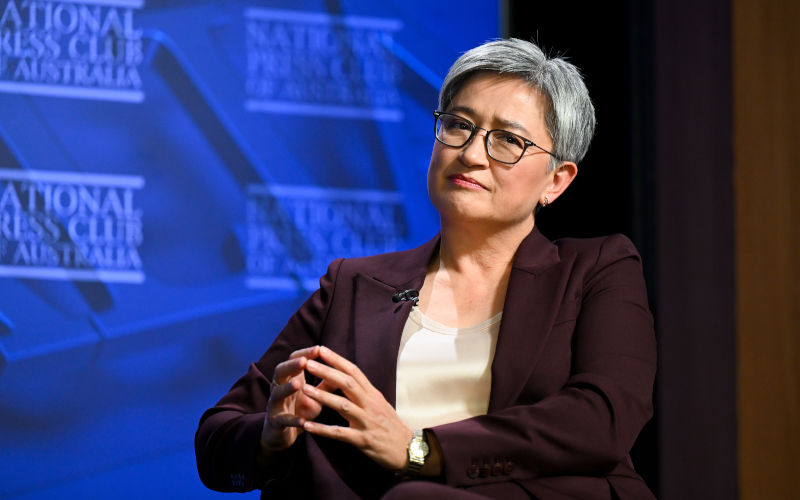CAMPAIGN NEWS:
Foreign Minister at the National Press Club
KEY POINTS
“I think the TPNW is of substantial normative value.” Foreign Minister Penny Wong.
We agree. The TPNW is intended to further stigmatise nuclear weapons in international law, as an essential step towards their elimination. The normative value of prohibiting an inhumane weapon is proven by the positive impacts the prohibitions of other weapons systems have had in vastly reducing, over time, their production, deployment, threat of use and use.
“In terms of the TPNW, I think the fact that so many states have signed it demonstrates the frustration that there has been insufficient progress in the context of the NPT, and if this can spur more progress in that arena, that is a good thing.” Foreign Minister Penny Wong.
We agree. The Treaty on the Prohibition of Nuclear Weapons was drafted to complement and reinforce the Nuclear Non-Proliferation Treaty. All TPNW states parties are also party to the NPT, and are fulfilling their obligations under the NPT’s Article 6, to pursue effective measures for disarmament. The TPNW is a permanent part of the global legal architecture for nuclear weapons, and its positive effects go beyond the implementation of the treaty itself. Australia must not limit its efforts on nuclear non-proliferation and disarmament to the NPT, but should join the TPNW and end any support for the potential use of nuclear weapons in Australia’s defence posture.
“The US has confirmed that the nuclear-powered submarines visiting Australia on rotation will be conventionally-armed.” Foreign Minister Penny Wong.
This is welcome news. Australia must also insist that any other US or UK vessels or aircraft that are deployed, stationed in or visiting Australia must not carry nuclear weapons or be nuclear-capable, including the US B-52 aircraft proposed to be stationed at RAAF Base Tindal, NT. The South Pacific Nuclear Free Zone, or Rarotonga Treaty, to which Australia is a party, prohibits the stationing of nuclear weapons in Australia.
“Labor has a proud history of championing practical international non-proliferation and disarmament efforts, having ratified the Treaty for the Non-Proliferation of Nuclear Weapons – and will ensure we continue to meet its obligations to the highest and most rigorous standards.” Foreign Minister Penny Wong.
Labor’s history of championing practical international non-proliferation and disarmament efforts must now include Australia’s signature and ratification of the Treaty on the Prohibition of Nuclear Weapons. Failure to do so would cast serious doubt on this history and Labor’s genuine commitment to advancing a world free of nuclear weapons.
“… our job is to lower the heat on any potential conflict, while increasing pressure on others to do the same.” Foreign Minister Penny Wong.
AUKUS and the acquisition of nuclear-powered submarines represents an escalation of tensions in the Asia-Pacific region. Joining the TPNW would lower the heat, and enable Australia to increase pressure on other nations to negotiate time-bound and verifiable agreements to disarm. When it comes to the risk of regional conflict and the potential escalation to the use of nuclear weapons, initiatives that repudiate support for the use or threat of use of nuclear weapons will help prevent a humanitarian catastrophe. Read ICAN’s recent briefing note here.
TRANSCRIPT EXCERPTS
Full transcript and video.
Foreign Minister Penny Wong:
“And some have raised concerns about nuclear non-proliferation.
Labor has a proud history of championing practical international non-proliferation and disarmament efforts, having ratified the Treaty for the Non-Proliferation of Nuclear Weapons – and will ensure we continue to meet its obligations to the highest and most rigorous standards.
Our AUKUS partners understand and recognise Australia’s commitments under international law, including the Treaty of Rarotonga.
Naval nuclear-propulsion is consistent with our obligations under the Treaty of Rarotonga.
The US has confirmed that the nuclear-powered submarines visiting Australia on rotation will be conventionally-armed.”
Guardian Australia foreign affairs correspondent, Daniel Hurst:
You spoke a lot in the speech about Australia sharpening its own articulation of its interest and regional interests. Many countries in our region including Indonesia, Malaysia, Fiji, Samoa, New Zealand, Thailand and the Philippines have signed the Treaty on the Prohibition of Nuclear Weapons [TPNW]. Labor had a platform commitment to sign and ratify it subject to several conditions. Do you expect Australia will be in a condition to sign it in this term of parliament and what undertakings have you given the US and UK on this front?
Foreign Minister Penny Wong:
The position, is not about any private undertakings, the position is what is articulated in the platform resolution which does go to some of the challenging issues associated with the TPNW. I think the TPNW is of substantial normative value.
We share the objective of a world that is free of nuclear weapons. We do believe the best pathway for that, is to ensure that the non-proliferation treaty, the NPT is acted upon and progressed. In terms of the TPNW, I think the fact that so many states have signed it demonstrates the frustration that there has been insufficient progress in the context of the NPT, and if this can spur that more progress in that arena, that is a good thing.
We set out very transparently in the party platform our consideration of that treaty.

